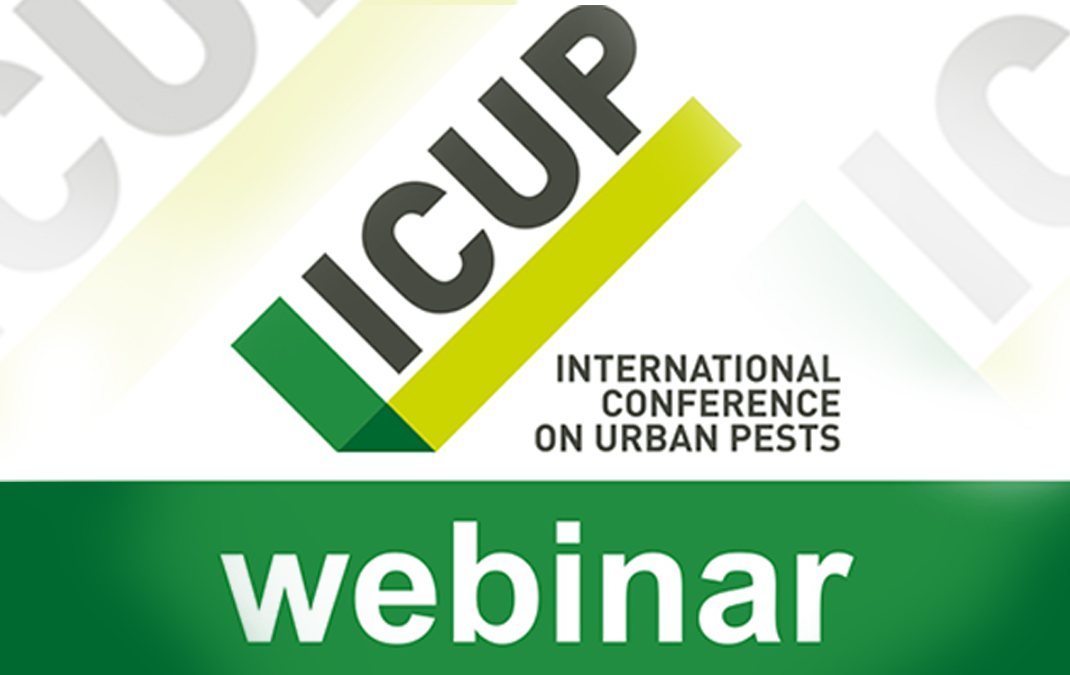Unable to meet face-to-face, nearly 500 members representing over 50 countries, of the International Conference on Urban Pests (ICUP) community met up on-line for the first ICUP webinar held on 9 March 2021.
Ruben Bueno, chaired the webinar and explained that he had hoped to have greeted delegates to the 10th ICUP conference, due to have been held in Barcelona, which had had to be cancelled due to the coronavirus pandemic. However, he said that all the ICUP organisers felt it was important that the group should maintain contact via this webinar until the next conference is held, which he hopes will still be held in Barcelona at some future date.
From over 130 papers offered for presentation at the postponed Barcelona conference, five were selected for presentation at this webinar, with the possibility of additional papers to be presented at a further webinar.
Speakers selected came from across Europe and the US. Research results presented covered topics ranging from rats in sewers in Barcelona, controlling yellow jackets in California, insect pests in Europe to mosquito control with the development of CRISPR gene-drive systems. After each presentation there was a lively exchange of questions and answers.
Climate change and the establishment on non-native arthropod species in domestic situations featured in the first two presentations. In the first, Federica Bolocchi, who recently joined the University of Milan, Italy, after completing her PhD research with Killgerm Chemicals Ltd and Aston University, detailed her findings on work identifying the range of arthropod species in parts of the UK along with any associated microbial communities. Much more specific, Klaus Zimmermann from Inatura GmbH, Austria detailed his findings regarding how rising summer temperatures are favouring the spread of the ferocious and very quick moving house centipede, Scutigera coleoptrata, in Central Europe. What is notable in both presentations is the use of Citizen Science in the collection of specimens. Or as Zimmermann describes it, ‘creative mapping’ where scientific data is combined with Citizen Science.
Looking to future control technologies, Victor Lopez Del Amo from the University of California, San Diego, USA outlined how CRISPR gene-drive technologies could be harnessed for mosquito control in urban areas. This technique would provide a valuable alternative to the currently employed insecticide treatments, for example impregnated bed nets or residual spraying, where resistance can become a problem. However, CRISPR research involves work on the genome sequencing of DNA, so may meet with resistance and a labelling of genetic meddling by the general public.
Moving away from insects, Jordi Pascual from the Public Health Agency in Barcelona reviewed his work evaluating the reproductive seasonality and fertility of Norway rats in the Barcelona sewers. As sewers maintain a relatively constant environment, it would be expected that there would be few variations in the rodents’ reproductive cycle. To his surprise, this proved not to be the case, with outside influences, such as temperature, exerting considerable effects.
Rounding the webinar off was a presentation covering palatability and attractiveness of yellowjacket baits in outdoor areas by Michael Rust from the University of California, Riverside USA. This was highly appropriate as he belongs to a very unique band of ICUP community members who have been to each and every ICUP conference since the first was held in Cambridge, UK in 1993.
Asked by Ruben Bueno why ICUP was special to him, Rust said: “These events allow us to exchange information and share the problems of pests in an urban environment. Coming from the US, it’s an ideal opportunity to discover what is happening in Europe. These events expand my horizon, plus they are always enjoyable!”
For those unable to attend the webinar live, or to simply to listen to the presentations again, they will be available shortly on the ICUP website until 6 April 2021. See HERE .
Drawing the webinar to a close, Bueno said nothing had yet been finalised, but it was hoping to hold the rearranged 10th ICUP in Barcelona at some future date.
As to be expected, Bill Robinson and Clive Boase, of the ICUP Executive Committee, have both been closely involved with organising this first webinar. After which they commented: “We are really pleased with the content and attendance of this debut webinar. We’re seriously considering further virtual events, to maintain the spirit of the ICUP community until we can meet again face-to-face.”
Watch out for announcements, or follow events on the new ICUP Twitter account @ICUP_Conference.











